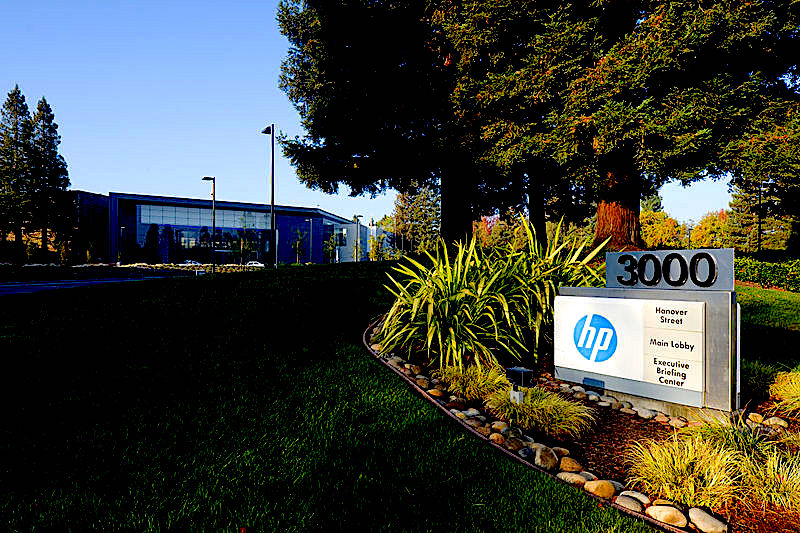 INFRA
INFRA
 INFRA
INFRA
 INFRA
INFRA
HP Inc. today soundly rejected an unsolicited bid by copier and printer stalwart Xerox Holdings Corp. to buy the personal computer and printer maker for $33.5 billion, saying it undervalues the company.
Xerox made the bid back on Nov. 5, a day after it was reported that its board discussed a cash and stock offer for the Palo Alto, California-based company, whose market value was about $27 billion at the time but whose annual revenue is about six times that of Xerox.
A deal, to which HP left the door slightly open despite the offer expiring Nov. 13, would have combined two struggling technology giants. Investors viewed it positively, as both companies’ stock rose Nov. 6, the day after the report.
But in a letter sent today to Xerox Vice Chairman and Chief Executive Officer John Visentin, HP said its board “unanimously concluded that it significantly undervalues HP and is not in the best interests of HP shareholders.” The letter cited the “highly conditional and uncertain nature of the proposal, including the potential impact of outsized debt levels on the combined company’s stock.”
In Xerox’s proposal included in HP’s letter, the Norwalk, Connecticut-based company offered HP shareholders $22 a share made up of $17 a share in cash and 0.137 Xerox shares for each HP share, for a total of $33.5 billion. HP shareholders would have 48% of the combined company.
According to Xerox, the deal offered a 20% premium to HP’s closing price of $18.40 a share on Nov. 5. It also said it would result in at least $14 billion in “incremental value” to the shareholders based on its calculation of the offer’s implied multiple of HP’s $4.8 billion in earnings before various adjustments for the last 12 months.
In addition, Xerox cited “cost synergies” of at least $2 billion in the next 24 months, mostly from streamlining research and development and other functions. “Our Board of Directors strongly believes the industry is overdue for consolidation and that those who move first will have a distinct advantage in a secularly declining macro environment,” Xerox said.
As for financing, Xerox was somewhat vague, saying it would fund the cash component with a combination of cash on hand and new financing, saying it has been in “ongoing discussions with Citi,” which provided a “highly confident letter” for arranging the financing.
Besides seizing on the uncertainty of the financing, HP directed a barb at Xerox, noting the decline of its revenue from $10.2 billion to $9.2 billion since June of last year, which “raises significant questions for us regarding the trajectory of your business and future prospects.”
However, HP also left the door ajar, saying that “with substantive engagement from Xerox management and access to diligence information on Xerox, we believe that we can quickly evaluate the merits of a potential transaction. We remain ready to engage with you to better understand your business and any value to be created from a combination.”
Indeed, HP may well be simply holding out for a better offer. “I do believe it’s a matter of money,” said Patrick Moorhead, principal analyst at Moor Insights & Strategy. “I am assuming, though, that the PC business would be spun off to generate cash for the deal.”
Despite Xerox’s point that first movers in a consolidating industry have advantages, the deal would hardly be the first in computing, as tech powerhouse Dell Technologies Inc. in particular has rolled up a number of acquisitions in computing, storage, networking and software for many years now. By contrast, HP and Xerox have been cutting costs for years in response to lower demand for printing and copying to competition from more successful broad suppliers such as Dell.
Even before the deal’s rejection, some analysts didn’t see much merit in it as proposed. “It could make sense buying HP’s printer business, but it doesn’t make any sense for the PC business,” Moorhead said at the time.
But Xerox, in particular 10.6% shareholder Carl Icahn, who also has a 4.2% stake in HP, might see some blood in the water. In August, HP said CEO Dion Weisler was leaving because of a “family health matter” it didn’t disclose. He was replaced by 30-year HP veteran Enrique Lores.
HP, which was spun out of Hewlett-Packard Co. in 2015 along with server and data center equipment maker Hewlett Packard Enterprise Co., has improved somewhat of late, reporting third-quarter financial results that topped expectations. But its stock is down 10% so far this year.
Moreover, it announced early last month that it would cut as many as 9,000 people, or 16% of its staff, to save up to $1 billion in annual expenses. The company will also take a $1 billion charge related to the plan, including $100 million in the current quarter, $500 million in fiscal 2020 and the rest split between fiscal years 2021 and 2022.
Xerox, in contrast, has seen its shares jump 84% this year following a cost-cutting round. It also reported an upside third quarter and raised its 2019 outlook. Visentin said on the company’s earnings conference call that better cash flow would allow it to do more deals.
Support our mission to keep content open and free by engaging with theCUBE community. Join theCUBE’s Alumni Trust Network, where technology leaders connect, share intelligence and create opportunities.
Founded by tech visionaries John Furrier and Dave Vellante, SiliconANGLE Media has built a dynamic ecosystem of industry-leading digital media brands that reach 15+ million elite tech professionals. Our new proprietary theCUBE AI Video Cloud is breaking ground in audience interaction, leveraging theCUBEai.com neural network to help technology companies make data-driven decisions and stay at the forefront of industry conversations.